By Alek Popov
Alek Popov (born Sofia, Bulgaria, 1966) is a leading Bulgarian writer, author of four novels, several collections of short stories and essays, scripts and plays. His hugely successful first novel, the comic satire Mission London, based on his experiences as diplomat, has been translated in sixteen languages. The book was filmed in 2010, becoming the most popular Bulgarian film since the revolution of 1990 and being described by Variety as ‘a breakthrough phenomenon’. The film won the Unbribable Award of Transparency International Croatia’s program “Culture against Corruption”. The Black Box (Elias Canetti Prize), his second novel, has so far appeared in six languages, including English, followed by the historical saga The Palaveev Sisters. In 2012, Alek Popov was elected corresponding member of the Bulgarian Academy of Science in the field of Arts.
In Bulgaria, thirty years ago, we were on the wrong side of the Iron Curtain, and we have observed many changes since, but the way we adapt to those changes on a personal level has been a parallel phenomenon in itself. And this is hardly a surprise, bearing in mind the intricacies of human nature. But then, again… Surprise, surprise! If as recently as 11 years ago anyone had imagined that our cultural landscape would be dominated by old-fashioned ethnocentrism, I would have probably laughed out loud. And yet, this turns out to be the case after the accession of Bulgaria to the EU! The “quest for roots” has become the most lucrative of all creative industries: restoring old customs, rebuilding ancient fortresses, theme parks, folklore festivals, historical TV programs, shamanic rituals and a newfound zeal for Orthodox Christianity – all warmly welcomed by both the official institutions and the general public. Where do we come from and who are our ancient ancestors? These “existential anxieties” of our society often find expression in absurd pseudo-scientific theories that pour water into the mill of cheap populism. Ironically enough, while countries like Bulgaria or Hungary, which are already members of EU, turn to their roots, imaginary or real, aspiring countries still outside of the EU are vigorously asserting their “European identity” – as was the case with Bulgaria itself just a decade ago. Why does this happen? It has something to do with the rise of nationalism all over the Europe, to which broad-scale existential insecurities, including demographic crises and the fear of migration, have contributed. But the EU’s own cultural policy is also responsible. For years now, it tends to emphasize differences and identity issues at the expense of a more universal approach. And this is where we are now! This seems to be the most remarkable trend in our culture, which goes to almost every level. So, I went with this small piece of writing to introduce the paradox in an allegorical way. And because, even outside of this context, the model of discontent always finds a way to persist – we imagine that “on the right side of the sea,” the grass is always greener and the sun is more beautiful.
Alek Popov
Every morning, on the Bulgarian Black Sea Coast, a young man sits on the sand to greet the sunrise. Right across the sea, on the Georgian coast, every evening another man sits on the sand to see off the sunset. Both of them are unaware of each other’s existence. Both dislike their lives – for pretty much the same reasons. Both seek refuge in dreams inspired by the solar cycle. And both of them, in their minds, travel homeward – to the place they consider their spiritual home. But this seems to be as far as the similarities between them go. They end up separated by what connects them.
Early morning. A young man performs wondrous physical exercises on the empty beach of Bourgas. His outfit consists of knee-length leather pants, crudely sewn together. A big stick is planted in the sand, with a tuft of long, fluttering black hair attached to it, a cross between a scalp and a horse tail. His movements are composed of a careful reconstruction of the martial art of the ancient Bulgarians, a.k.a. Bou Vei – lost over centuries of slavery and nihilism, only to resurface on the crest of the ever-rising ethno-wave that splashed over Bulgaria after its historic accession to the EU.
The young man has mastered the ancient practices during his summer vacation in one of the training camps where old Bulgar martial arts are taught. Their reconstruction relies partially on analogies with the martial arts of the East, partially on information from medieval chronicles, but mostly on the intuitive feel and enthusiasm of the followers of the glorious ancestors. Those of them in the know are particularly enraptured with an authentic miniature from the Menology of the Byzantine Emperor Basil II, preserved today in the library of the Vatican. It depicts a Bulgar warrior applying a typical wrestling move to his opponent – a Christian, adorned with the halo of a martyr.
It is a little before 7 a.m. The sun majestically swims out of the level expanse of the Black Sea; the breeze blows away the last traces of hydrocarbon floating in the air from the night shift emissions of the Neftochim oil refinery. The young man, who goes by Ivan in everyday life, sits down on the cool sand, faces the sunrise and plunges into meditation. He is now Korasté – the name through which he merges with the spirits of the great forefathers. Every original Bulgar name must carry the consonant r– a source of manhood and strength. Krum, Kubrat, Isperih, Omurtag, Tervel. If it appears twice, even better – Krakra. However, there are already two Krakras in the group, and Bagatura Kormisosh, their leader, instructed him to choose a different name. The problem with the authentic Bulgar names is that there are too few of them. Barely a dozen have traversed the darkness of antiquity, and demand is much higher. New ones must be coined, and this requires a refined philological intuition. He screws his eyes shut and rummages through little pieces of paper in a fur hat. He is granted the dignified and melodious name of Korasté.
If this is your will, so be it, oh, Tangra!
The red disc of the sun smoothly slides up over the horizon. The surface of the water glistens, along with memories of past greatness, cleansed of the rust of time and oblivion, of the stains of failure, treason, historical injustice and the pitiful present. A hot tear rolls down the young warrior’s bristly cheek. Over there somewhere, beyond the sea, in the steppe between the Dniester and the Caucasus, lies the Old Great Bulgaria. The ancient capital of Phanagoria stands proudly on the coast of the Taman Peninsula: horse tails blowing in the breeze, numberless herds graze around white yurts; children learn horseback riding and archery. In the palace, KanasubigiKubrat receives the messengers of the Byzantine Emperor, who gave him the title of “brother” and showered him with gifts. Then, a bit further north, between the Volga and the Urals lies Volga Bulgaria – the state of the great Kotrag, a land of affluent and blessed cities, where the people retain their Bulgar roots to this day. But the soul flies on, even further east, over the Caspian Sea and Khwarazm to the distant, snow-covered ridge of the mythical Mount Imeon. Urheimat! The prehistorical homeland! The Balkh Kingdom, described in the Mahabharata. The rock-hard Bactria! Alexander the Great marries the Bulgarian princess Roxana, to avoid fighting her invincible cavalry. Roxana is the most beautiful woman of all time – Helen of Troy can eat her heart out! In the Hindu Kush valleys, people still say “beautiful as a Bulgarian.” They have even preserved the root of kushta, the Bulgarian word for “house.”
It is almost 8 a.m. Several swarthy Indo-Europeans approach from the far end of the beach, dragging black plastic bags and sporting orange vests labeled “City Cleaning.” Startled, Korasté looks at his watch, then jumps to his feet. He changes hastily, slipping the Bulgar pants in his backpack (pants are also a Bulgarian invention, in case you didn’t know, just like the pastirma, the ayran, the sword, the saddle and other such achievements of progress!) mounts the noisy Vespa scooter allotted to him from the consumer basket and rushes off to work. At exactly 8:25, he screeches to a halt in front of the back entrance of the Bourgas BILLA. He checks his name on the list and a few minutes later we see him walking toward the cold meats counter, donning a uniform shirt and an apron with a name tag swinging from it – Ivan.
“Ivaaan,” the manager of the processed foods section scolds him loudly. “Don’t cut the pastirma in such thick chunks, we had a complaint come in the other day! Is that clear?”
In the meantime, the sun imperturbably does its rounds, like it has done millions of times, long before horse tails began fluttering along the shores of the Black Sea. A little after 6 p.m., when Korasté slowly shakes off Ivan and prepares to down his first beer, on the other side of the sea, in the ancient land of Iberia, a dashing Georgian, of the same age, sits down on the beach near Poti to see off the red orb that is about to plunge into the darkness.
The threatening silhouettes of Russian Black Sea fleet cruisers and frigates loom in the sunset background, patrolling the Georgian coast after the latest skirmishes between the former empire and the proud Caucasus republic. But no warships can restrain the flight of Merab Gamkrelidze’s westward-bound soul. Unlike their onetime neighbors, the Bulgarians, his forefathers never left their blessed prehistoric homeland. They just sat there, locked in its fertile valleys, for as long as they could remember! And yet, a treacherous thought creeps over him – had they moved their butts back in the day, we could have been on the other side of the sea now… The sunsets over there may not be as beautiful, but, as we know, they have the EU and NATO, the Russian gunboats cannot even venture near. Besides, the agricultural producers receive subsidies, and the roads are in way better shape. The unemployment rate is below the sanitary minimum. Consumer credit is easy to obtain. It is even easier to spend; all the large supermarket chains have already landed there – from BILLA to Carrefour and Tesco – making global standard goods and services widely available. But most importantly, people can travel. This, mind you, is worth all the BILLAs put together! With nothing but a simple ID card you can trek all over Europe, Merab sighs to himself, his mind already bouncing on the bus to Vienna. He visits the Sigmund Freud Museum, snacks on Wienerwurst on the Graben and listens to the street musicians. From Vienna, en route to Rome via Venice. He takes a gondola taxi, shakes hands with the Pope and walks around the Coliseum. Then, he boards a WizzAir flight to Paris for the price of a train ticket from Tbilisi to Poti. Paris! The capital of culture: Beaubourg, le Louvre, Opéra, La Sorbonne (where Merab Mamardashvili himself gave talks!) le Quartier Latin, Montmartre… A hot tear rolls down the cheek of the young jigit. This is the tradition he and his people belong to, not the wild Asian steppe. This is his spiritual home! Next, he could take off for London, Berlin, or Amsterdam, it makes no difference.
Merab is home.
The sun has already sunk in the sea. Only the Russian ships glimmer in the dark. They trace the horizon like Christmas lights, reminding him of the limits of the physical reality he is forced to inhabit. He gets up in anger, turns his back on the sea and straddles his Soviet-era IZj-2 motorcycle. He has 200 homework papers to grade at home, entitled, The Greatness of the Georgian People through the Eyes of Shota Rustaveli. He must finish them by morning. The doors of Europe begin to close, slowly, yet relentlessly. Until the next sunset.
Translated by Velina Minkoff

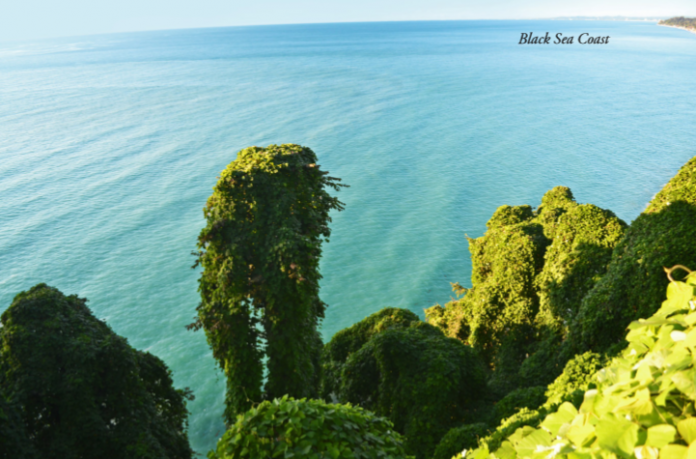
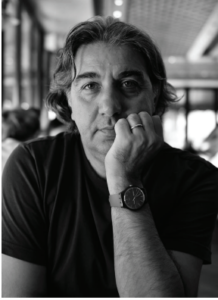
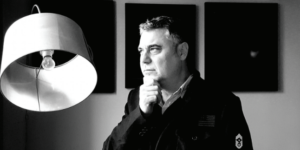
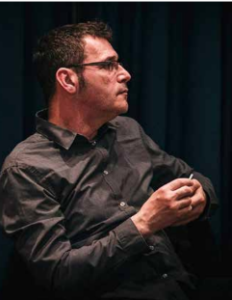
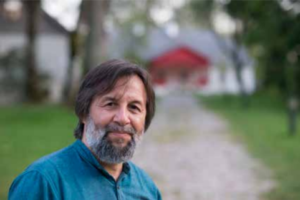
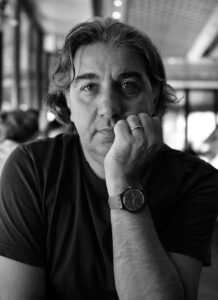
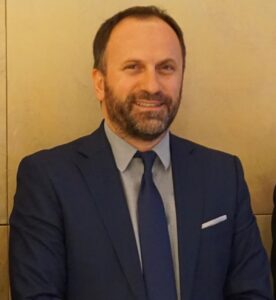
No comment